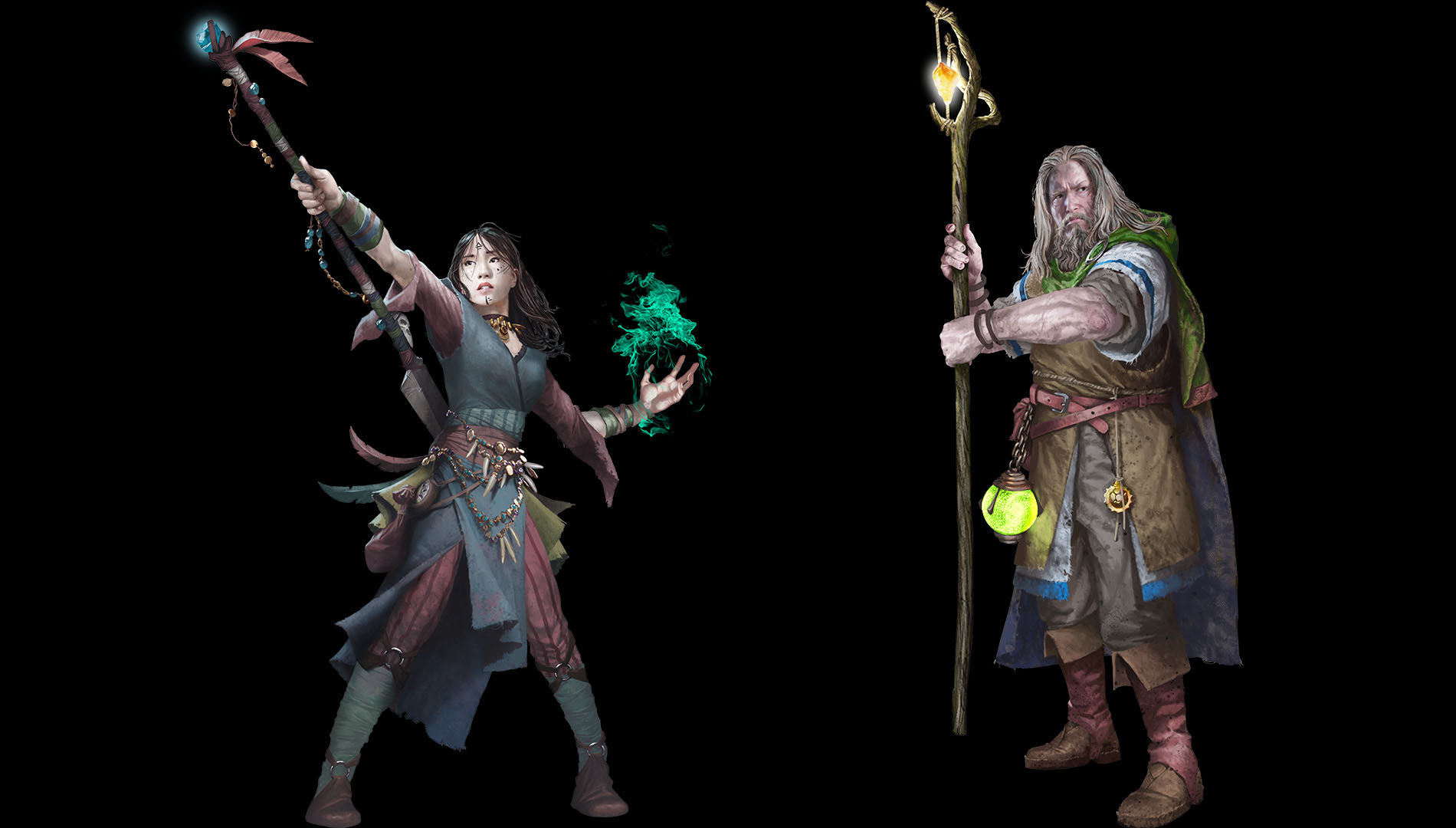
Maladum is the name that the denizens of Enveron have for magic, and the central focus it plays in the game is reflected in the game’s title. We’re really excited about the new elements that it brings to your game choices and its ability to create fun cinematic moments. Using it effectively will also make the difference between your Adventurers leaving the dungeon as wealthy heroes – or becoming raw materials for the creation of more Revenants. This means that getting the most out of your magic users is going to play an important part in the success of your quests.
There isn’t just one kind of Maladaar in the lands of Enveron; practitioners specialise in different areas of expertise. What this means in game terms is that you can choose classes to suit the way you want to play – or get a fresh experience by choosing a different kind.
For example, choosing a Rook gives you powerful abilities to hinder your foes, but their limited defensive options mean they need protecting. They are a great choice if you want to subtly influence your opponents, perhaps tricking them into attacking an Illusion to create an opening for you to slip through, or softening them up for your fighters with a Weaken Armour spell. Or to quote one of our playtesters:
“Illusion just lets you mess with the system a bit and you can set up some real problems for strong enemies.”
– Rob, Maladum Playtester
Maladum comes in three kinds:
- Proximate, which affects the caster. For example, by making them faster, stronger, or even changing their appearance.
- Vicarious, which affects other people and creatures. For example, by healing others, making them see illusions, or even taking control of them.
- Elemental, which affects the environment and inanimate objects. This could be to move objects around, or focus fire into a powerful blast.
Picking a Prymorist, on the other hand, means relying almost exclusively on the power of the elements. They are a better option if you want to blast your enemies to bits with a Fireball, or form mounds of rubble into a protective barrier with the Barricade spell.
Selecting either will give you a distinct experience, creating different challenges and new opportunities.
“I think I should also add, you can play a Maladaar and do zero offensive spells. In my games Beren is just The Dude, chilling out and healing his buddies.”
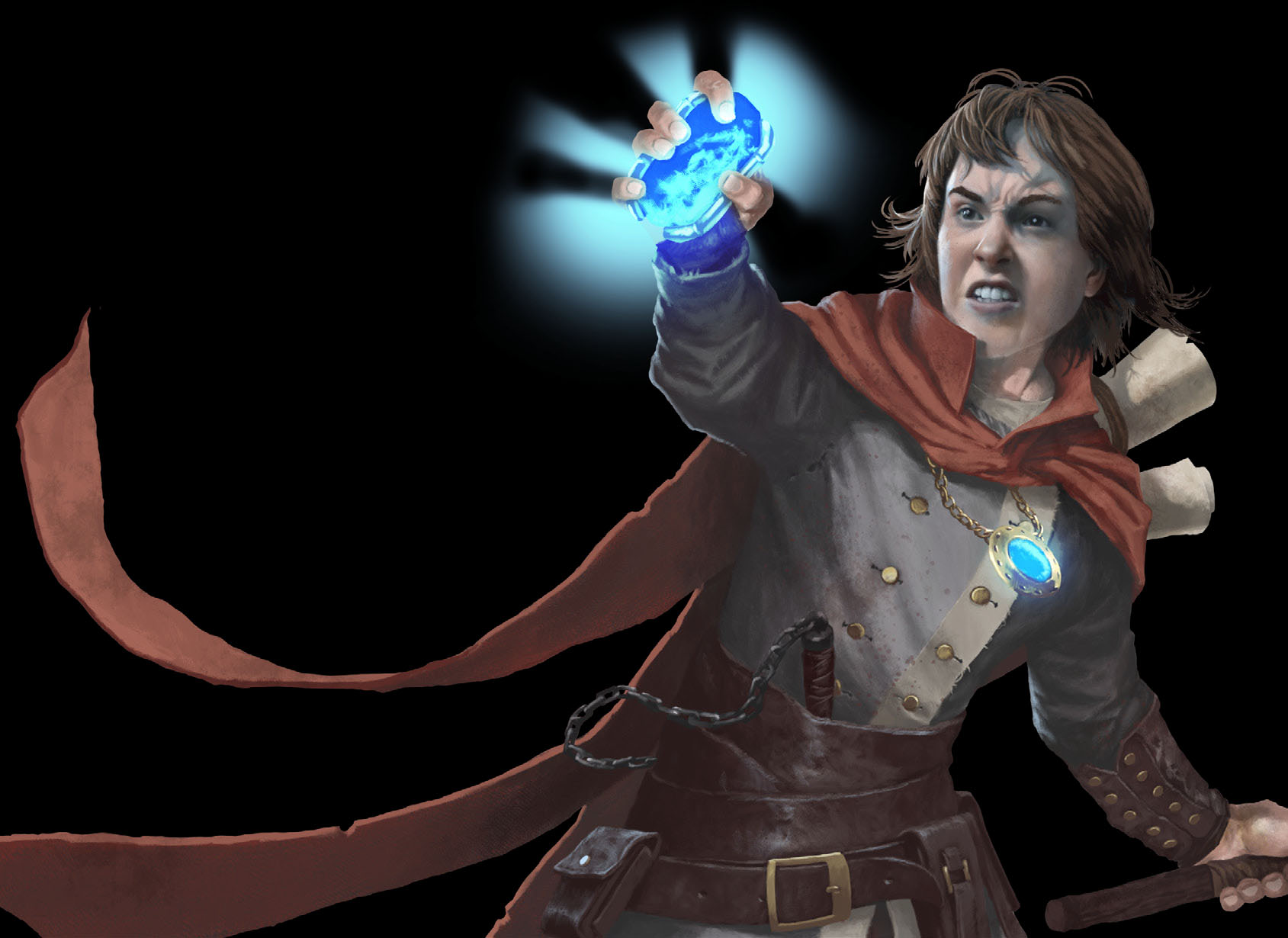
Your Spellbook
Your Maladaar gets to select a number of spells when you create them and you can decide to pick new spells as an alternative to levelling up your skills. So, which to pick? This is going to depend on how you want to play and we’ve created a diverse menu of arcane choices so you can tailor your choice to suit your play style.
You might choose the Bless spell and use it liberally to give your fragile low-level characters a vital edge, through the ability to reroll one of their opponent’s dice or one of their own. Or the flexible Rearrange Cells spell to turn yourself into a beast, choosing a combination of enhancements to your armour, speed, close combat attacks, or adding characteristics to your attacks like Sharp or Bludgeoning. You can even change your size to become Terrifying. This high-level spell takes a lot of resources to cast, but can really save the day when used right.
It’s also worth remembering that although you can only select spells at your level when you level up, you can select spells from up to level 3 when you’re creating your character. This is a good time to grab some of the powerful spells early on, like Cocoon which lets you rest even when surrounded by enemies. (See our post about Resting for more about the Cocoon spell.)
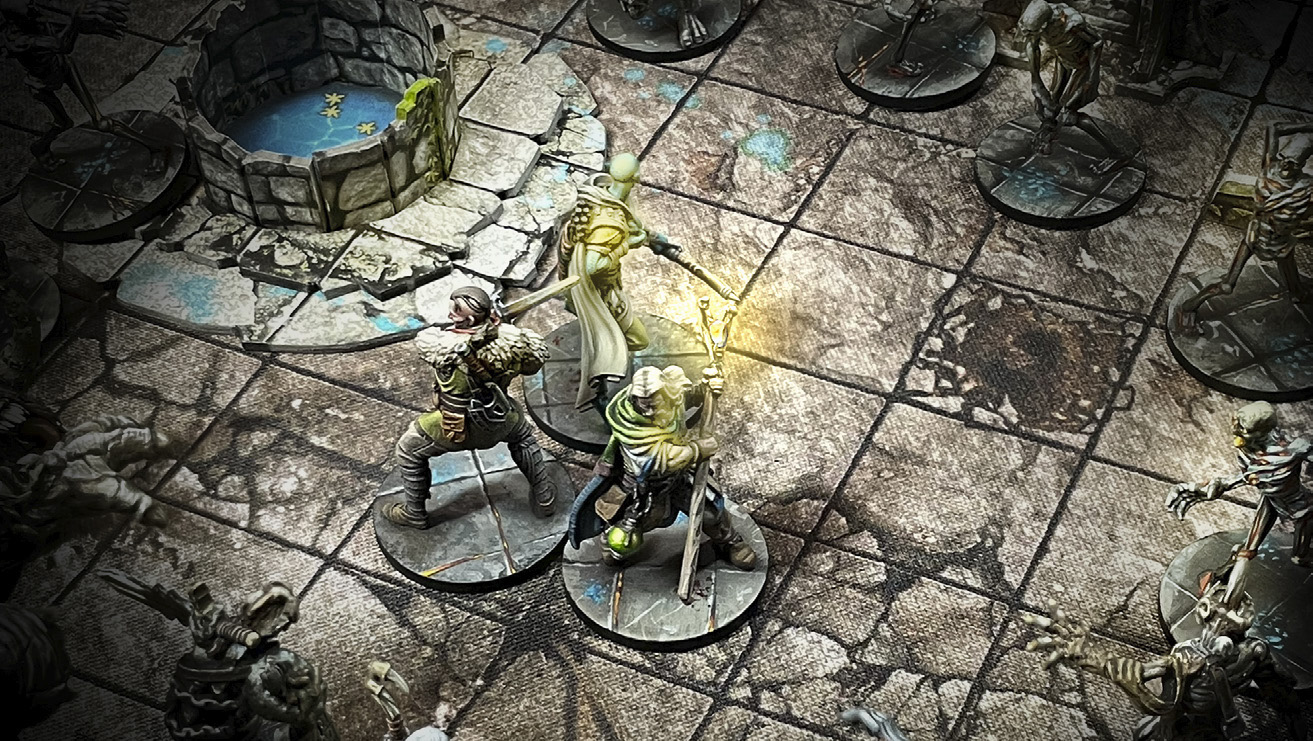
Levelling up your Maladaar with Skills
Each class of Maladaar comes with a set of skills like any other adventurer. It’s tempting to invest your upgrades into acquiring new spells, but it pays to consider your skills too. Having a long list of spells is great, but not a lot of use if you roll a one on the Magic die and they fail to go off or when you’ve run out of Magic pegs.
For example, the Nanite Mastery skill tree gives you the ability to cast any level one spell, even if you don’t have access to it, representing them remembering their basic training. Need to quickly heal up your Rook? Nanite Mastery lets them grab the Heal spell for a round even though they can’t normally pick it. At level two, you passively regenerate a Magic peg every Assessment phase too which lets your Maladaar keep casting longer, and you get to use a Reaction to reroll the Magic die, so you can pick the preferred result and make your spells more reliable.
“I think one thing this system absolutely nails is that Maladaar feel incredibly powerful, but at enormous risk. You’re setting up your pieces like 3D chess and plan multiple activations ahead… and your Maladaar rolls a 4 and, all of a sudden, everyone is everywhere, prone.”
Rob, Maladum Playtester
Nanite Mastery makes your spells better, but other skills can keep you alive long enough to cast them. For example, Counter Shot lets you spend a Skill peg to shoot back with a Ranged Attack or spell when you are shot at, letting you thin out enemies that might kill you if they got the chance to take another attack. Or you could take a more defensive approach with the Duck For Cover skill, which lets you use Skill pegs to move into cover when you are shot at, and even ignore the damage from it entirely once you’ve levelled the skill up.
This combination of skills and spells gives you the ability to build a party around different styles of play and lets you explore interesting new combinations. We also have a variety of Adventurers and Classes for you to pick from, which creates even more flexibility through their different strengths and weaknesses.

Adventurers and Classes
The core box has two Adventurers that are optimised to be Maladaar, Beren and Moranna. Also included are three Class boards that you can choose from: the elemental Prymorist, the Proximate-focused Eudaemon, and the Rook which specialises in spells that affect others. More Classes will be coming in expansions, like the combat-focused Magus, or Paladin who is mainly a fighter, but also has some support spells.
Wherever possible we try to design flexibility and customisability into our games to let you make them your own. This extends to Adventurers and Classes too and you can combine them however you like to make less obvious combinations. This isn’t just a quirky thing to do, it can be an interesting and viable build. Grogmar’s toughness and innate fighting ability, for example, make him an obvious choice for a fighter. But if you make him a Eudaemon or Magus class he gets access to proximate spells that make him stronger, faster, and tougher and let him heal quickly – turning him into a magic-infused combat monster. A literal monster when you pick up the Rearrange Cells spell at higher levels potentially.
Conversely, you could give an Adventurer with a large number of Magic pegs a non-magic class. They can still use this huge stockpile of Magic pegs for other things like powering gear or shrugging off hostile spells. Being able to swing a magically powered sword consistently turn-after-turn, while healing yourself with a magical crystal, is a great option.
Moranna
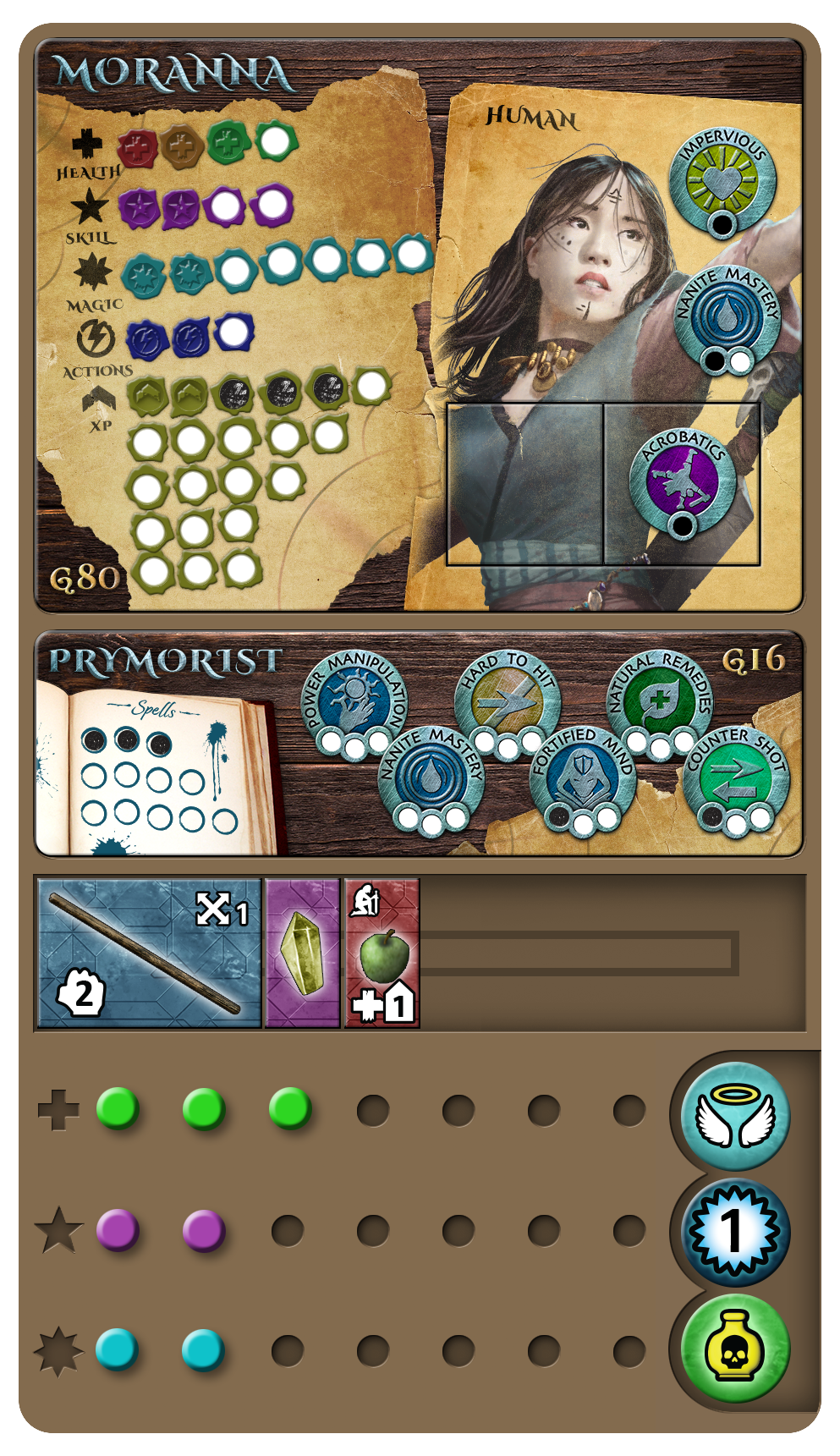
The Maladum rule book recommends taking Moranna with the Prymorist Class in your party for the first few missions. Let’s use this as a tangible example so we unpack how a Maladaar contributes to your team and the role that can play.
Let’s start with her stats: Moranna has fewer Health pegs than other Adventurers, and little room to improve them, so you’ll want to keep her off the frontlines if you can. However, she makes up for this with a huge amount of magical potential. As you can see here, she starts with a couple of Magic pegs, but she can level this up to a whopping seven pegs over time. Like most characters, she starts with two Actions per turn, but unlike most, can level up to three Actions per turn – making her a powerhouse later in the campaign. That extra action can make all the difference.
She also has a solid set of skills, starting with two Skill pegs and with the ability to increase this to four. This is going to be invaluable because she has an array of helpful skills at her disposal. She has two innate skills that are found on her board and they work well with her role: Nanite Mastery and Impervious. We’ve seen the benefits of the first earlier in this article, so I won’t cover that again, but the second is going to help her shrug off Status counters like Fatigue or Wounded that would otherwise be a real danger to her. You can learn more about Status effects in an upcoming article.
Moranna also has a third innate skill, Acrobatics, that should help her stay a few steps ahead of the Revenants with an extra move and the passive ability to get back on her feet as an Effortless action. This one works a little differently as it is displayed in her Armour Slot, so she loses access to it if she fills that slot. This is another example of the interesting choices you have to make in the game – is it better to be more mobile or to sacrifice Acrobatics for more protective gear? The answer is that it’s going to depend on your strategy for the game.
Her main skills are tailored to help her to survive and add to her potency. Power Manipulation gives her access to more spells from her full list and later lets her boost them to make them stronger. Hard to Hit makes it easier for her to take cover and avoid damage, while Natural Remedies helps her restore her precious Health. Both of these are critical for an Adventurer with few Health pegs. Fortified Mind helps her to hold her focus and cast spells even when caught in close combat. And finally, Counter Shot allows her to retaliate with a spell if she is targeted with a Ranged Attack, thinning out enemies that might take her out if they lived longer.
The recommended starting spells for her are:
- Barricade, which gives you the ability to control the board by blocking enemy paths and to deal with traps such as blocking up pits,
- And Focused Energy, which is a ranged attack that gives her a way to strike from a safer distance.
When you level up you will probably want to pick Protect to give you some armour for a round, for emergencies.
As you can see, there is a lot more going on than just blasting away with your spells. Your Maladaar are important members of your party, but to get the most out of them you’ll need to consider their weaknesses, position them with care, and combine their skills with their spells to get a bigger impact. Even choosing the right spell can make all the difference: is it better to blast an enemy with Focused Energy or to Bless one of your fighters to give them a better chance of defeating the foe in one blow? I hope after reading this you’re as excited as we are about the new layers of fun that magic brings to the game and the awesome force of nature that your Maladaar has the potential to become.
With all that said, sometimes the dice just don’t like you and then you just have to do whatever it takes to live another day. To quote one of our playtesters:
“This one time the day was saved on my last possible action, on my last activation of the Adventurer Phase, Beren just ran out of options and threw a hatchet at a Hellfont and critical hit it, saving the party from certain doom.”
Rob, Maladum Playtester


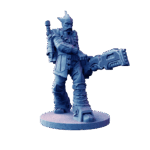
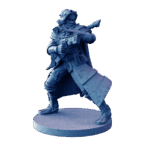
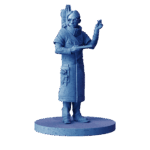
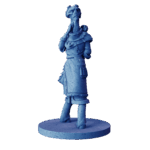
Start the conversation